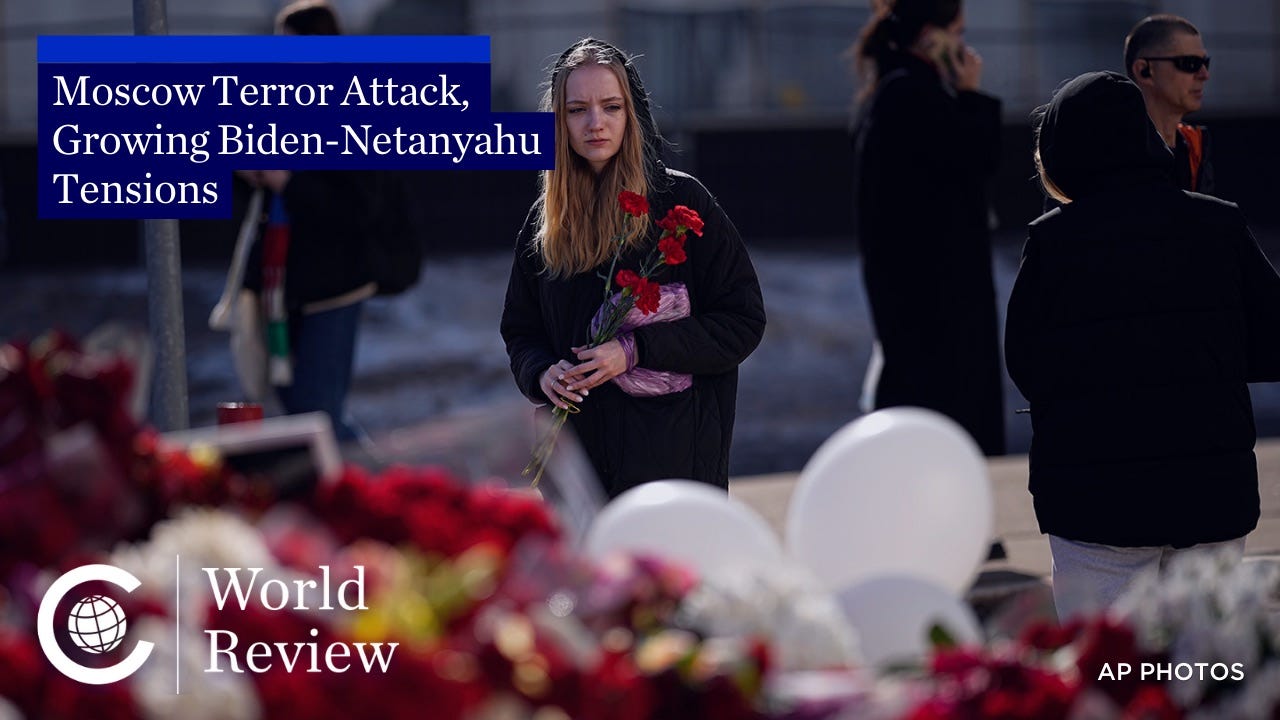World Review: Moscow Terror Attack, Growing Biden-Netanyahu Tensions
A brief synopsis of this week's show
Each Friday morning, I host a video podcast called “World Review with Ivo Daalder” where three journalists from major news outlets around the world join me in discussing the latest global news stories of the week.
This morning, March 29, I was joined by Cathrine Philp of The Times, Philip Stephens of the Financial Times, and Matt Kaminski of Politico.
“World Review is always fascinating. I love the fact that you can get journalists from around the world to participate since zoom is the medium.”
— A Subscriber to America Abroad
While I encourage you to watch or listen to the episode (and subscribe wherever you get your podcasts!), here are a couple of interesting things I took away from our discussion :
Last Friday’s terrorist attacks in Moscow left over 140 people and many more wounded. It came as a deadly surprise to the Kremlin—even though the CIA had warned an attack by an ISIS offshoot was imminent and had told the Russian FSB (the intelligence service) that the Crocus City concert venue where the attack took place was a possible target. But Vladimir Putin had other priorities—winning an election, suppressing internal dissent, and beating Ukraine. Not surprisingly, the Kremlin blamed Ukraine and the West for the attacks—even though ISIS Khorasan claimed responsibility and the four suspects who were caught had been shown on ISIS-K videos prior to the attack. But whatever happens in Russia has to fit the dominant narrative, and all institutions have to march to the same dominant tune—which is that Russia is at war with the West. The FSB took its eye of real threats to feed Putin’s narrative of imaginary ones—including Jehovah witnesses and LGBTQ+ groups that Moscow has declared “extremist.” They have become “Putin’s praetorian guard,” Catherine said of the FSB, no longer interested in protecting the country only its unassailable leader.
The Moscow attack did shine a bright light on the fact that much of the world, which was once consumed with the “global war on terror,” had moved on to focusing on the wars in Ukraine and the Middle East and strategic competition with China. Now, Philip suggested, the pendulum is swinging back, especially in Europe. British and other officials see three consequences from the Gaza war. First, the war is empowering all the bad guys in the Middle East—Hizbollah, the Houthis, Islamic militias, and Iran. Second, it is empowering Islamic extremists. ISIS-K was already growing and increasingly active in Afghanistan and its immediate neighborhood, but now increasingly in Europe as well, where Germany, France, and Belgium among others broke up terror plots in recent months. Finally, the war is radicalizing domestic Muslim communities throughout Europe. All of this puts the terror threat very much back on the agenda, and with major sporting events kicking off this summer in Paris (Olympics) and Germany (Eurocup), there are plenty of targets that will need to be defended.
On Monday, the United States for the first time since October 7 did not veto a UN resolution demanding a ceasefire and the release of all hostages. Israeli Prime Minister Benjamin Netanyahu reacted with fury, deeming the move a betrayal. But, as Matt argued, this may be more political theater than a strategic break. Biden and Bibi are waiting each other out politically. Biden is under attack from his progressive flank and young voters, and he believes that once Bibi is gone it will be easier to get Israel to agree to end the war or change strategy to a much more targeted counterterrorism operation. Bibi is deeply unpopular and would likely see the end of his political career if he were to step down as prime minister or his right-wing cabinet collapsed. Blaming Biden strengthens his hand at home and if Trump were to come back he could again count on a supportive administration. Meanwhile the war and suffering continue unabated.
That’s it for my quick takes of this week’s episode here on America Abroad. To get the full flavor, please listen to the episode itself.



